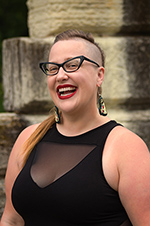 Past judge and contributor Francine Cunningham talks with one of the two Novella Prize judges for our 2024 contest. They discuss experimenting with form, the role of writing in today’s world, and how the novella has that forgotten-room-in-that-forgotten-place kind of zing.
Past judge and contributor Francine Cunningham talks with one of the two Novella Prize judges for our 2024 contest. They discuss experimenting with form, the role of writing in today’s world, and how the novella has that forgotten-room-in-that-forgotten-place kind of zing.
FC: What are you looking for in a winning entry?
JF:
To be surprised. The hard and the soft. The human, the more-than-human. Language that insists I take notice. Hopeful questions. Many answers.
If it helps to make any of those statements more solid my favourite novellas this semester were Becky Chambers’ A Psalm for the Wild-Built (tea monk! robot! road trip!), Sarah Gailey’s Upright Women Wanted (the “West” revisited as very effing queer! librarians as hero! road trip!), and Sarah Tolmie’s All the Horses of Iceland (horses! saga/history as story! road trip!).
I mean, it’s so obvious now. But I do love a good road trip.
And I truly can’t wait to read your take on what the novella can do.
FC: What kind of stories are you drawn to and why?
JF:
It might be a fault in my character, or it might be the human condition but I’m consistently drawn to stories that let me into the character’s hardest moments. Yet alongside that experience, I always want to be let into the characters softest moments too. Stories that manage to do both, or where in the first few pages I get the sense that the author is willing to do both—the hard and the soft, the cruel, the mean and the kind, the many sides of what makes us all human in this more-than-human world—then I’m along for the read.
Read the rest of Jenny Ferguson's interview.
Jack Wang,
Novella Prize judge
 Fiction Editorial Board member Sarah Lachmansingh talks with one of the two Novella Prize judges for our 2024 contest. They discuss the editing process, writing advice, and how a novella finds the fulcrum between discipline and capaciousness.
Fiction Editorial Board member Sarah Lachmansingh talks with one of the two Novella Prize judges for our 2024 contest. They discuss the editing process, writing advice, and how a novella finds the fulcrum between discipline and capaciousness.
SL: What are you looking for in a winning submission?
JW:
Many who aspire to “literary fiction” think that action and event are somehow gauche. That’s because plot has been so thoroughly co-opted by popular forms of entertainment. To my mind, though, literary fiction depends on the skillful orchestration of language, character, and plot. It’s hard, actually, to make interesting things happen in plausible, artful, and psychologically astute ways. I’m open to a novella that’s unafraid to make things happen.
SL: What interests you most about the novella as a form?
JW:
It’s often said that a novella combines the economy of a short story with the development of a novel, but “economy” and “development” can describe both form and content. Sometimes in a novella, novelistic content is given short story treatment. Other times, short story content is given novelistic treatment. And still other times, in what we might call the classically proportioned novella, medium-length content is given medium-length treatment. It’s always interesting to see how a novella finds the fulcrum between discipline and capaciousness.
Read the rest of Jack Wang's interview.